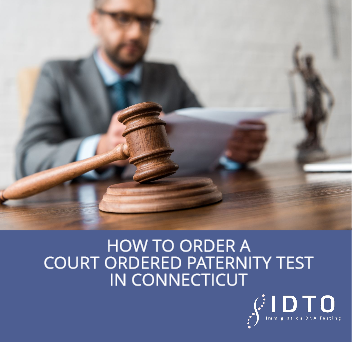For unmarried couples in Connecticut, paternity can feel like a confusing maze of legal procedures and forms. However, establishing paternity is an important step to provide critical emotional, financial and legal security for both the father and the child.
While there is no statute of limitations, it is best to proactively navigate the courts and file the proper petition as early as possible. In this post, we will discuss the process of getting a court ordered DNA test.

How to file a Petition to establish paternity in Connecticut?
Getting a court ordered paternity test
File a petition: A paternity petition has to be filed for court order to be issued. There are two ways paternity DNA test results can used as evidence in family court. Get Connecticut petition to establish paternity forms here.
Judge Issues A Court Order: When a judge requests DNA testing be performed the judge will instruct the parties involved on where they DNA samples are to collected if the state is cover the cost.
In cases where the Department of Children and Families (DCF). is involved. (DCF) case worker is responsible for walking both parties through the process of establishing the paternity of a child in Connecticut using genetic testing.
Court Turnaround Times
The turnaround times for court organized DNA Tests can be lengthy. It often takes several weeks to a few months. We recommend speaking with the personnel in charge of your case to inquire about wait times.
Please note: This information provided in this post regarding Connecticut paternity establishment guidelines are informational use only and not legal advice. We recommend speaking with a family law professional for a detailed understanding of the process.
Paternity Test Without a Court Order: A legal paternity test can be performed with or without court order and used as evidence later when you file petition in Family Court. Below are few things you need to know to successfully perform a court admissible DNA paternity test result.
1. All legal paternity tests must be tested and analyzed by an AABB accredited laboratory.
2. It is recommended that the participate in the testing process if available.
3. At-Home DNA Test Kits do not meet the criteria for establish a proper chain of custody therefor the results are not recognized by Family Courts and cannot be used for any legal purpose.
Out-of pocket Completion Times
The average turnaround time for legal paternity test results from IDTO DNA Testing Center is 2 to 3 business days from the date in which lab receives all genetic samples. For legal paternity testing questions or appointments. Call 877-680-5800 for quotes and to get started.
Upon the completion of your results a copy will mailed to your and another will be emailed to you for your records. In cases were a judge may request the lab to send the results directly to their office. Just provide your assigned caseworker with the additional details.
Connecticut’s Voluntary Acknowledgment of Paternity
If an unmarried couple are certain the man is the biological father of their child. Signing a VAP form at the hospital or local county health department after the birth.
Related Questions
How long does a father have to establish paternity in Connecticut?
There isn’t a specific deadline for a father to establish paternity in Connecticut. However, there are different scenarios depending on when the father wants to be included on the birth certificate:
Before the birth certificate is filed:
- Voluntary Acknowledgement of Paternity: This form can be completed by both parents anytime before the birth certificate is filed. This is the easiest and most straightforward way to establish paternity.
After the birth certificate is filed:
- If the father wants his information added to the birth certificate after it’s already been filed, both parents would still need to complete the Acknowledgement of Paternity form. However, they would need to submit it to the Paternity Registry at the Department of Public Health instead of the birthing facility.
It’s important to note that establishing paternity carries legal rights and responsibilities for the father, including potential child support obligations. If there are any concerns or disputes regarding paternity, it’s recommended to consult with an attorney to understand the legal implications and options available.

